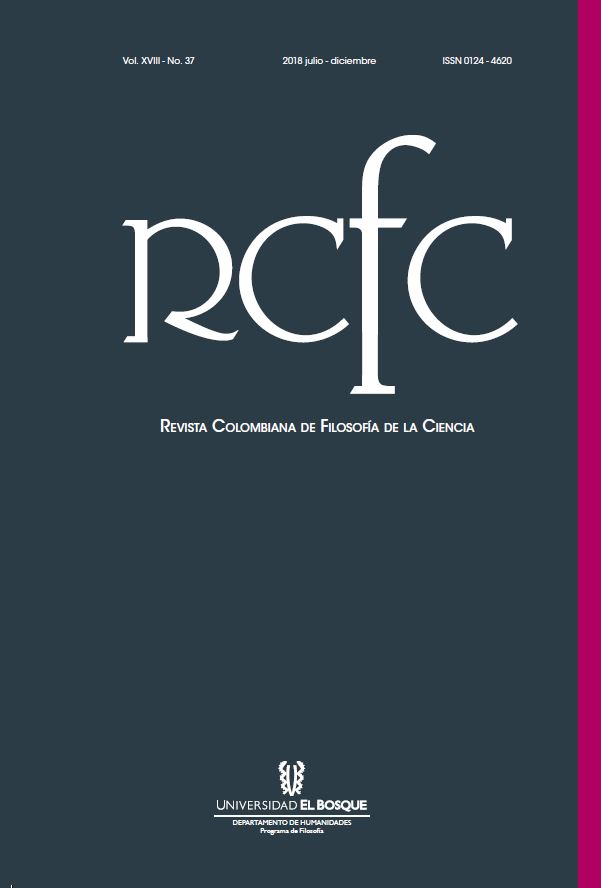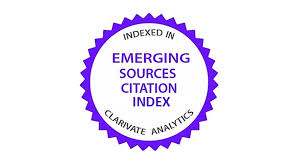Historicism, history and philosophy of science
DOI:
https://doi.org/10.18270/rcfc.v18i37.2574Keywords:
Relationship history philosophy of science, historicism, philosophy of naturalized scienceAbstract
If we recognize that the objectivity of Scientific Knowledge can not be supported by a priori criteria, then two types of project are presented to characterize this objectivity: the Naturalized Proposals that try to sustain it in Science itself and the Historicist Proposals that seek to sustain it in the History of the Science. We point out that the compatibility of these two types of project is achieved by setting aside Individualistic Models of Human Cognition and, rather, focusing the attention of Philosophy of Science on Practices (and not on Theories).
Downloads
References
Atran, Scott. Cognitive Foundations of Natural History. Cambridge: Cambridge University Press, 1990.
Boutroux, Emile. The Contingency of the Laws of Nature. 1874. Trad. Fred Torhwell. Londres: The Open Court Publishing Company, 1920.
Carnap, Rudolf. The Logical Structure of the World. Berkeley: University of California Press, 1928.
Castro Moreno, Julio A. “Estilos de razonamiento, prácticas científicas y epistemología histórica. Una propuesta de articulación entre historia y la filosofía de la ciencia”. Rev. Colom. Filos. Cienc. 18.37 (2018): 119-153. <10.18270/RCFC.V18I37.2551>
Crombie, Alistair Cameron. Style of Scientific Thinking in the European Tradition. Londres: Duckworth, 1994.
Feyerabend, Paul. “Consolations for the Specialist”. Criticism and the Growth of Knowledge. Eds. Imre Lakatos y Alan Musgrave. Londres: Cambridge University Press, 1970. 197-230.
Fleck, Ludwik. “Zur Krise der Wirklichkeit”. Naturwissenschaften 17.1 (1929): 425-430.
______. Erfahrung und Tatsache. Frankfurt: Suhrkamp, 1983.
______. Genesis and Development of a Scientific Fact. 1935. Trads. Fred Bradley y Thaddeus J. Trenn. Eds. Thaddeus J. Trenn y Robert K. Merton. Chicago: Chicago University Press, 1979.
Gellman, Susan y Lawrence A. Hirschfeld. “How Biological is Essentialism?”. Folkbiology. Eds. Douglas L. Medin y Scott Adran. Cambrdige MA: MIT Press, 1999. 403-446.
Giere, Ronald. “Review: History and Philosophy of Science: Intimate Relationship or Marriage of Convenience?”. The British Journal for the Philosophy of Science 24.3 (1973): 282-297.
______. “Philosophy of Science Naturalized”. Philosophy of Science 52.3 (1985): 331-356.
Hacking, Ian. “Language, Truth and Reason”. Rationality and Relativism. Eds. Hollis y Steven Luck. Cambrdige MA: MIT Press, 1982. 46-66.
______. Representing and Intervening. Cambrdige: Cambridge University Press, 1983.
______. “Style for Historians and Philosophers”. Studies in History and Philosophy of Science 23.1 (1992): 1-20.
______. El surgimiento de la probabilidad: un estudio filosófico de las ideas tempranas acerca de la probabilidad, la inducción y la inferencia estadística. (1975). Trad. José A. Alvarez. Barcelona: Gedisa, 2005.
Kuhn, Thomas S. The Structure of Scientific Revolutions. Chicago: The University of Chicago, 1962.
Lakatos, Imre y Alan Musgrave. Criticism and the Growth of Knowledge. Londres: Cambridge University Press, 1970.
Martínez, Sergio. “On Changing Views about Physical Law, Evolution and Progress in the Second Half of the Nineteenth Century”. Ludus Vitalis 8.13 (2000): 53-70.
______. “The Scientific Undercurrents of Philosophical Naturalism”. Reflections on Naturalism. Comps. Alberto Cordero e Ignacio Galparsolo. Rotterdam: Amsterdam Sense, 2013. 105-128.
______. “Technological Scaffoldings for the Evolution of Culture and Cognition”. Developing Scaffolds in Evolution, Culture and Cognition. Comps. Linnda R. Caporael, James Griesemer y William C. Wimsatt. Cambridge MA: MIT Press, 2014. 249-264.
______. “Cultura material y cognición social”. Cognición: estudios multidisciplinarios. Eds. Jonatan García Campos y Miriam Romo Pimentel. Centro de Estudios Filosóficos, Políticos y Sociales. Ciudad de México: V. Lombardo Toledano, 2016. 247-264.
______. “Nota Editorial: Historia y Filosofía de la Ciencia”. Rev. Colomb. Filos. Cienc. 18.37 (2018): 7-21.
Laudan, Larry. Progress and its Problems. Berkeley: University of California Press, 1978.
Nietzsche, Friedrich. La gaya ciencia. 1882. Trad. Juan Luis Vermal. Madrid: Tecnos, 2016.
Riezler, Kurt. “Die Krise der Wirklichkeit”. Naturwissenschaften 16.1 (1928): 705-712.
Salmon, Wesley. “Bayes’s Theorem and the History of Science”. Historical and Philosophical Perspectives of Science. Ed. Roger H. Stuewer. Minneapolis: University of Minnesota Press, 1969. 68-86.
Shimony, Abner. “Comment on Wartofsky”. Naturalistic Epistemology: A Symposium of Two Decades. Eds. Abner Shimony y Debra Nails. Springer, 1987. 375-377.
Schickore, Jutta “More Thoughts on HPS: Another 20 Years Later”. Perspectives on Science 19.4 (2011): 453-481.
Wartofsky, Marx W. “Epistemology Historicized”. Naturalistic Epistemology: A Symposium of Two Decades. Eds. Abner Shimony y Debra Nails. Heildelberg: Springer, 1987. 357-374.
Downloads
Published
How to Cite
Issue
Section

| Article metrics | |
|---|---|
| Abstract views | |
| Galley vies | |
| PDF Views | |
| HTML views | |
| Other views | |











